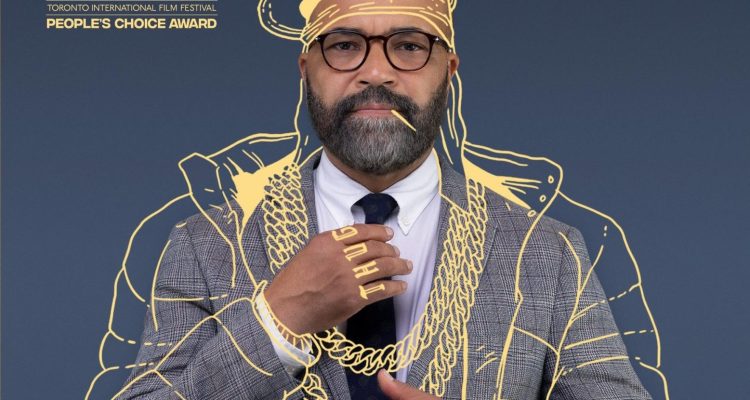Writer and Director Cord Jefferson delivers a rich social commentary that leaves no one unscathes with the brilliant, inflammatory, and insightful tale of American Fiction. Adapted from “Erasure”, the 2001 by Percival Everett, Jefferson shows a real talent in his directorial debut.
The film follows a middle class English professor and struggling writer Thelonious “Monk” Ellison (Jeffrey Wright). Monk believes that as a black writer his novels are black literature that will one day… in time… find their audience.
The publishing industry seems to think differently. The “Black stories” that the predominately white publishers seem to want are the ones defined through poverty, guns, drugs, gang violence, degradation, and all sorts of depressing stereotypes of socioeconomic disadvantage.
Monk’s novels have not returned any real financial value and Monk is at a place where he could very much use some additional income. Specifically, he had a costly back and forth with one of his students and his words triggered the student, and that triggered the University to put Monk on unpaid leave.
At the same time, Monk sees the massive success found by another black writer (Issa Rae) who isn’t afraid to offer the publishers what they want with her book, We’s Lives in Da Ghetto.
The movie reaches comedic heights when Monk decides to drunkenly write what publishing world seems to crave… a novel entitled My Pafology. He played into every stereotype he could imagine, adopting the name “Stagg R. Leigh” to attach to the lengthy garbage.
Monk’s incendiary manuscript becomes a hot commodity, with plans to adapt it into a movie if Monk will — as his fugitive alter ego — meet with the film’s producer. Monk is aghast but the money is very appealing, so he pauses his moral superiority for the easy money.
Frustrated by the ever expanding interest in his farcical manuscript, Monk actively tries to make his manuscript objectively worse, and at every step it only seems to have the opposite reaction among white editors and agents and producers salivating to celebrate it.
There’s a very telling scene where Monk is part of a literary award body scouring through manuscripts for potential worthy award-winners. He and Issa Rae’s author find common ground in that they are critical of My Pafology and its adherence to harmful stereotypes, but the white liberals won’t hear it and want to reward it.
To Monk’s ire and chagrin, there is no bottom when it comes to the appetite for degrading stories that neatly fit into a pre-existing mold.
The frustrated-meets-comedic of Jeffrey Wright as Monk is worth of Oscar attention, without question. It’s wonderful to see such a well-written role performed by Wright, taking center stage away from Batman and James Bond.
The best scenes in the film are between Wright’s Monk and his eager agent Arthur, played perfectly by John Ortiz (who was equally note-perfect in his performance in Tom Hardy’s underrated The Drop).
Monk’s unexpected journey of discovery and success allows him to assess how far he’s willing to go along with a deceptive narrative in a ludicrous industry of perception. Wright’s performance is equal parts amusement as a conman who can’t believe he keeps getting away with it, and boiling anger for the fact that his writing that he IS passionate about gets zero play with these brainwashed publishers.
The film’s main plot, described above, is nothing short of inspired. The family drama that encompasses Monk’s life is far less engaging and the tonal shift and pacing lags in the B plot of the film.
Monk’s need for money is underlined beyond his university leave, as he has to care for his mother following the unexpected passing of his sister (Tracee Ellis Ross). The scenes where he cares for ailing mother who needs assisted living aides due to her dementia feel generic and far less impactful. The scenes where Monk explores dating are equally deflating for the film’s pacing.
The one fantastic element of exploring Monk’s family is the relationship with his brother, Clifford (Sterling K. Brown), who is embracing his black sheep status in the family as an openly gay middle-aged man. Like their sister, Clifford is a doctor but he seems more focused on paying for drugs and young lovers than caring for the parents who didn’t truly accept him. Wright and Brown are electric on screen and Brown delivers heartbreaking scenes as well as comedic beats that keep the family plotline engaging.
The Hollywood satire continues to evolve as Adam Brody’s shallow movie producer closes the film with a meta discussion on how to give it a proper — yet believable — Hollywood ending. It’s a bit jarring to watch literal rewrites occurring on screen (although it gives the public a taste of the editing process).
However, Jefferson has played with fantastical elements earlier in the film. Two pitch perfect cameos by Keith David and Okieriete Onaodowan, playing characters in Monk’s book as they act out his scene in his study. The characters even interact with the author as he changes lines and story points in real time… it’s a fun beat that allows us to get a visceral look at the material contained in My Pafology (at least before the title was changed to F*ck)
Despite criticism of screenplay elements, the strengths of this film far outweigh the quibbles that I observed in the melodrama. I was thoroughly impressed by Jefferson’s hilarious cultural commentary, the performances drawn out of this impeccable cast, and how Jefferson built Monk’s absurd journey on the page to its fantastical conclusion.
Laura Karpman’s jazzy score was also a delightful highlight, as the musical style supports the highs and lows of Wright’s journey as Monk. The score has a textured flavor and indelible intimacy, particularly in scenes between Monk and Clifford.
The film is a triumph and I thoroughly expect multiple nominations for Jefferson, in addition to those garnered by Karpman, Wright, and Brown.
Letter Grade: A


